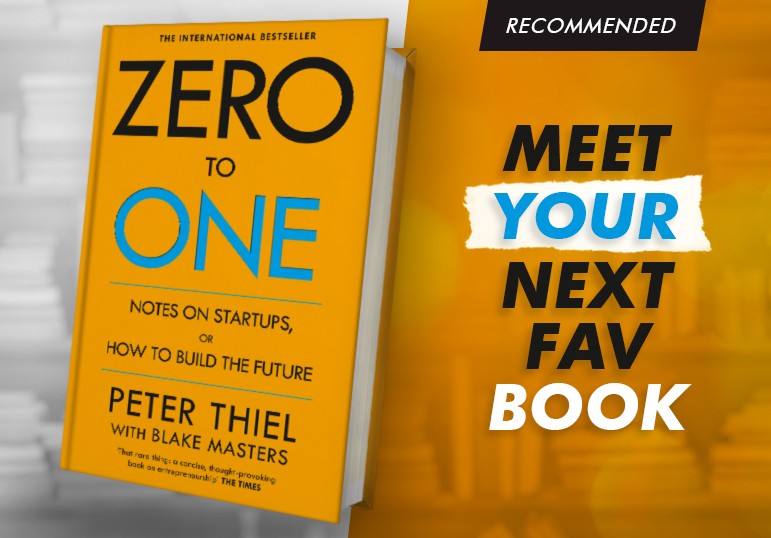
Book Review: Zero To One By Peter Thiel With Blake Masters
- posted by: Abdul Latif Dadabhouy
- No Comments
How to Build The Future? An important and attractive line for most of us, enough to be reading on any bookshelf and stop for a second and wonder… what future do we want to build up? Similarly, we picked out the international bestseller “Zero to One,” which will guide you on ‘Notes on Startups, or How to Build the Future,’ and also was a recommended read for start-ups, entrepreneurs, and innovators, by Peter Thiel.
About the Author
Peter Andreas Thiel is a German-American billionaire entrepreneur and venture capitalist. A co-founder of PayPal, Palantir Technologies, and Founders Fund, he was the first outside investor in Facebook. He studied philosophy at Stanford University, graduating with a B.A. in 1989. He then earned his J.D. from Stanford Law School in 1992. He co-founded PayPal in 1999, serving as a chief executive officer until its sale to eBay in 2002 for $1.5 billion. Peter was ranked No. 4 on the Forbes Midas List of 2014, with a net worth of around $2.2 billion, and No. 391 on the Forbes 400 in 2020, with a net worth of $2.1 billion. Thiel became Facebook’s first outside investor when he acquired a 10.2% stake for $500,000 in August 2004. He sold the majority of his shares in Facebook for over $1 billion in 2012 but remains on the board of directors.
Peter Thiel held regular lectures at Stanford University in 2012. In cooperation with a student of this class, Blake Masters, Thiel took those class notes and published them as the book “Zero to One”.

Main Context
“What important truth do very few people agree with you on?” The two-hundred-pager starts off with an interesting question like someone would ask in an interview, these are the types of questions that are easier to ask to yourselves in daily life. The question however correlates with business and often works well in it. The book title also suggests a progression of your business or any start-up from Zero to One! The book is broken down into 14 chapters, each delivering an important single message.
Monopoly For Business
Reaching the state of monopoly is the highest goal for every company. However, this comes off as very challenging if you are kick-starting your business/start-up in competitive markets. And if there are already some products similar to yours with a satisfying sale around the consumers, the challenge would double up, and the chances of becoming a monopoly are low. Therefore, horizontal progress is not a solution. The only way is to make progress is 0 to 1. And through that way, the product gets 10x better than the closest competitors. Or otherwise, your product might get rejected and others would be preferred.

Living Under a Power Law
Peter mentions in the put about the famous saying that ‘Don’t put all your eggs in one basket.’ The idea revolves around this that how compound interest is vital and also an example from Finance. However, power law seems to be a wider concept that people and the system better care of. He explains how through a different educational progression of a student, he or she would not stick to just course work. Extracurricular activities are important as well and that students should not focus on one major career and major without working on their craft, or else that would become unintuitive. To have a successful perspective for their thing smart investors will decide to chase only one thing and invest hard on as few products as possible to follow the sense of power law.
Is Every Valuable Company a Secret at First?
Every great company was once unknown. Nobody suspected them to grow. Secrets are the underlying weapon behind them. The Author determines two types of secrets: the secrets about nature, and about people. There are characteristics of secrets about people. Sometimes people don’t know secrets about their own selves and sometimes they hide them deliberately. While starting out a company or introducing a product in the market, you should always navigate yourself with questions like what kind of secrets is nature not telling you. And the best place where you can find those secrets is where no one is looking at.

Setting a Foundation for a Company
The opportunity of setting a premise is a chance which in usual cases is given only once. Taking the initial decisions when starting out creates a concrete foundation for the whole product or even a company. One of the most important elements is who is joining on board and who is co-founding. Every start-up has flaws and fluctuations, but trust is the key! Everyone in the founding team has to be full-time, with undivided devotion. The people who work in the beginning have to be clearly distinguished in terms of their responsibilities and feel they are given the opportunity to do the irreplaceable job.
The book is easy to digest, without overwhelming terminologies and business concepts, along with a super-easy approach to plan a start-up with entrepreneurial wisdom. From macro to micro, the book covers up strong topics with real-world examples, as “Great business is defined by its ability to generate cash flows in the future.”
RECOMMENDED BOOKS
If you like this review you can also check these
– Can’t Hurt Me By David Goggins Review




